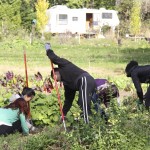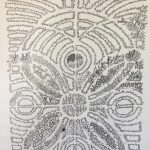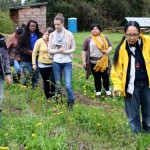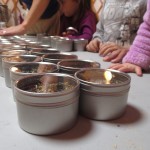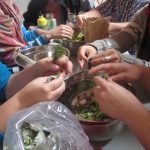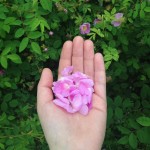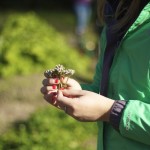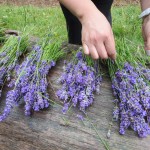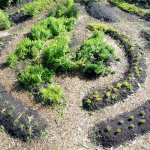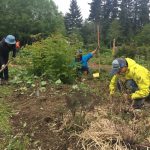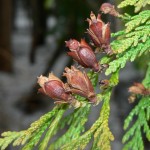Indigenous Research and Education Internship Program at xʷc̓ic̓əsəm

PURPOSE
Our research training approach respects Indigenous worldviews and pedagogies and supports a shift toward including diverse Indigenous perspectives and ways of knowing for all learners. The Internship Program is based at xʷc̓ic̓əsəm Garden at UBC Farm and is collectively led by a group of Indigenous Elders, knowledge keepers, community members, students, and Indigenous Faculty. Students participate in ongoing research projects with faculty, graduate students, and community members. They participate in planning, designing, and implementing a pilot-scale research project and assist in data collection using qualitative and quantitative methods and Indigenous methodologies. Students learn about Indigenous research frameworks, research methodologies, land-based pedagogies, and research ethics (e.g., Tri-Council Policy Statement (TCPS), UBC Behavioural Research Ethics Board (BREB)), and Indigenous Community protocols for reciprocal and productive community engagement. The PURE builds on existing relationships, both on and off campus, to develop an innovative learning model and curricula focusing on Indigenous land-based education to create opportunities and build research capacity in undergraduate students.
RATIONALE
Indigenous land-based pedagogies address dispossession in urban and land-based settings while moving away from state dependence by constructing Indigenous alternatives to capitalism and neo-colonialism (Barker, 2015; Storrie, 2015; Alfred, 2005; Seton, 1999). Indigenous initiatives at UBC Farm are led by Indigenous elders, knowledge holders, community members, students, and Indigenous Faculty. This learning environment has the potential to respond to students’ interests, establish community pre-research engagements (Gomes et al., 2013) and mobilize the concept of the land as the teacher (Simpson, 2014; Wildcat et al. 2014).
This PURE proposal is strongly aligned with numerous transformative documents and instruments, including:
- Truth and Reconciliation Canada (TRC) Calls to Action: (Call 63) “building student capacity for intercultural understanding, empathy, and mutual respect” and (Call 92) the need for training in “conflict resolution, intercultural competency, human rights, and anti-racism.”
- UBC “Shaping our Century” Strategic Plan (2018) goals: (1) to “partner with Indigenous communities on and off campus to address the legacy of colonialism and to co-develop knowledge and relationships” and (2) to “inspire and enable students through excellence in transformative teaching, mentoring, advising and the student experience.”
- UN Declaration on the Rights of Indigenous Peoples (UNDRIP) calls to “address the needs for building cultural competency and Indigenous research capacity among researchers, students, and communities.”
- UBC Aboriginal Strategic Plan (2018) recommendations to (1) “prepare students for land-based learning and understandings, work in ways that support the local community, and reflection on the process” and (2) address the need for “Land-Based Initiatives such as curricular developments, often in partnership with Indigenous communities or organizations, through which students learn in a community setting fostering partnerships with Aboriginal communities.”
• TRC and the UBC Aboriginal Strategic Plan also addressed the need for building research capacity and reciprocal, relevant, and respectful community relations and the creation of a fundamental shift in directions to incorporate indigenous knowledge systems into University education and research. These necessary actions mirror UBC People and Places’ goal to engage in the “co-creation of curricula and research projects of importance to Indigenous people and their communities.
PARTNERSHIPS
This PURE partnership includes: (1) the First Nations House of Learning, (2) Indigenous Education, (3) Indigenous Teacher Education Program (NITEP), (3) Faculty of Land and Food Systems (LFS) Learning Centre, (4) Centre for Teaching, Learning and Technology (CTLT) Indigenous Initiatives, (5) LFS Indigenous Research Partnership, (6) Supporting Aboriginal Graduate Enhancement (SAGE), and additional extended networks including Indigenous communities. Our team is composed of Indigenous scholars who have been practicing community-engaged scholarship and land-based initiatives and partners with interdisciplinary research expertise. The networks of collaborators include Elders, knowledge holder, Indigenous communities, scholars, students, and organizations. The project brings a collective of Indigenous practitioners to support the training of undergraduate students in research capacity, enhancing the learning environment at xʷc̓ic̓əsəm Garden, and the mobilization of traditional knowledge using a multi-forum model inclusive of Indigenous land-based education, health and wellness, and food/medicinal systems.
OVERARCHING GOAL: Develop an Indigenous land-based research experience to increase the capacity of undergraduate students to access, use and produce Indigenous research.
SPECIFIC OBJECTIVES: Provide a land-based learning experience within an Indigenous research framework including training in cultural competency, research ethics, community engagement, research methodologies, and community-based participatory action research implementation.
RESEARCH TRAINING FRAMEWORK
The proposed framework follows the processes of land preparation, planting, and harvesting. Each training phase acknowledges and celebrates the generosity of the land as a way to learn about reciprocity, relevance, relationships, and respect. The framework facilitates a language and process connecting Indigenous research and community engagement, and is based on the following pathways as proposed by Young (2015 et al.):
Indigenous culture: central to the revitalization of Indigenous knowledge, thus researchers and educators must know how to access local Indigenous knowledge holders appropriately and learn to partner with proper local resource people for a decolonizing and strength-based approach (Elliot et al. 2012).
Land: part of an interactive ecology and is necessary to understand how alternative ecologies can be sustained by developing local partnerships, by understanding how the genealogies are connected to traditional territories, and how to create ethical space and provide access to Indigenous knowledge holders (Fieldhouse & Thompson, 2011; Gomes et al. 2013; Anderson, 2010).
Orality (RCAP, 1996): the use of story (Archibald, 2008), ceremony, songs (Nadeau and Young, 2008), prayers (Battiste, 2013), language (Weber-Pillwax, 2001), dreams (Castellano, 2008), performance (Marshall et al., 2009), and genealogy (Young, 2015; Donald et al., 2012) as primary modes of teaching; local protocol principles are followed, local relationships to the land are negotiated, and protocol principles for each are modified (Battiste, 2013; Adese, 2014).
Community: aligning educators and learners with local self-determining initiatives, Indigenous sovereignty, and access to healthy environments; the respectful engagement with peoples and places, and supporting local community events (Cidro & Martens, 2014).
Ethics: the interweaving practice with sustainable, health-enhancing, and decolonizing agendas and with mutually beneficent mechanisms (Ermine & Hampton, 2007; Schnarch, 2005; Castellano, 2000).
Our approach respects Indigenous worldviews and aims to enhance teaching and learning by shifting toward the inclusion of diverse ways of knowing for all learners. We introduce students to qualitative research methods including in-depth interviews, focus groups, open-ended interviews, and Indigenous methods such as sharing circles, symbol-based reflection (Lavallee, 2009), participatory observation, storywork (Archibald, 2008) and Story/Dialogue methods of gathering experiential knowledge (Coady, 2014).
EXPECTED OUTCOMES
Knowledge Creation/Intellectual: this PURE support and generate Indigenous scholarship by examining place-based expressions of Indigenous knowledge using an Indigenous land-based pedagogies framework and knowledge mobilization.
Student training: students learn about ethical and political dimensions of conducting research with Indigenous communities in B.C. and research methods that are culturally appropriate when working with Indigenous people. Students gain theoretically innovative and multi-method fieldwork training in addition to analyzing and interpreting qualitative data.\
Research Collaboration: this interdisciplinary PURE cultivate dialogue and stronger ties between aboriginal communities and various departments at UBC including the Faculty of Land and Food Systems, the Indigenous Education Institute of Canada, Faculty of Education Indigenous Curriculum and Pedagogy, First Nations House of Learning, NITEP, and First Nations Indigenous Studies.
Social Contribution: research results be shared with participating Indigenous communities and academic audiences through multiple mechanisms and pathways.
Enriched Public Discourse: our team engage in public discourse by mobilizing the voices of Indigenous people and creating knowledge on how sovereignty is thought about and practiced in Indigenous communities, in both urban and rural contexts.
SIGNIFICANCE AND IMPACT
The training program aims to influence the development of cultural environments capable of connecting cross-cultural knowledge, and increasing our collective understanding of individuals and societies in the context of Indigenous research. The program also seek to influence the development of curricula capable of connecting cross-cultural knowledge and of increasing our collective understanding of Indigenous people. Students gain a better understanding of Indigenous land-based knowledge and learn skills to explore people’s stories, and creatively engage in research activities that facilitate holistic learning. They have opportunities to access culturally restorative education, as recommended by the United Nations Declaration on the Rights of Indigenous Peoples (2007), Convention on the Rights of the Child (1990) and the Canadian Truth and Reconciliation Commission (2015).
Furthermore, students experience alternative ways to contribute to a restorative process of Indigenous resurgence (Alfred, 2007; 2005) and reconciliation. Building relationships, ceremony, environments and contexts for passing on knowledge continues to be a foundation for the creation, translation, access, and usage of traditional knowledge. We also aim to make a significant contribution to critical theoretical debates on effective Indigenous research, cultural competency, and curricula.
